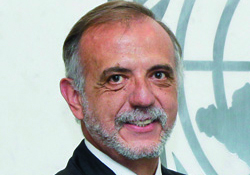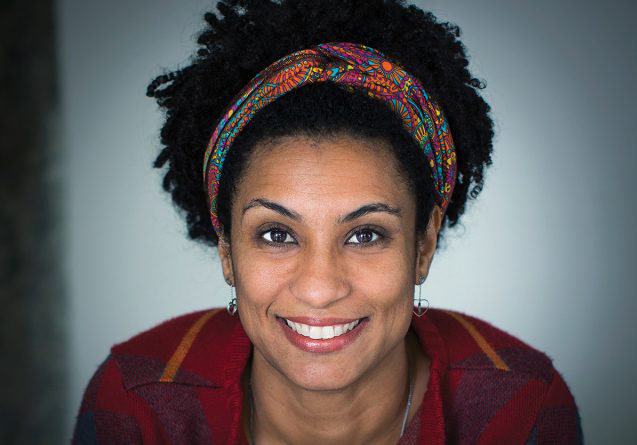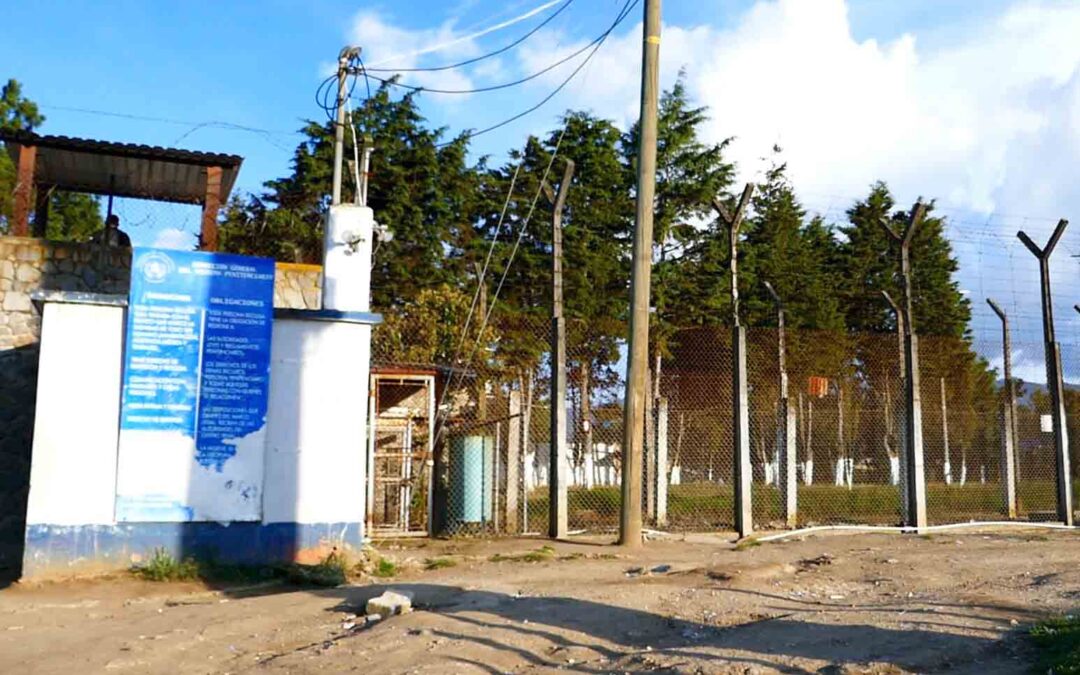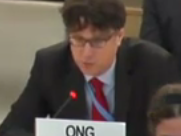
Apr 4, 2018 | Comunicados de prensa, Noticias
La CIJ está hondamente preocupada ante la falta de independencia de los miembros de la comisión de postulación para la elección de fiscal general.
Desde el 27 de agosto de 2017, cuando el Presidente de la República declaró “persona non grata” al Comisionado de la Comisión Internacional contra la Impunidad (CICIG), Iván Velásquez (foto), el Estado de Derecho de Guatemala viene siendo seriamente afectado por diferentes funcionarios al más alto nivel.
En dicha ocasión, la Corte de Constitucionalidad jugó un papel primordial en la defensa del Orden Constitucional y a favor del rescate del Estado de Derecho, al emitir varias resoluciones que lograron detener las acciones ilegítimas, que intentaron implementar al más alto nivel, el Presidente de la República y las y los diputados del Congreso de la República, para consolidar la impunidad.
En este contexto, se ha llevado a cabo la primera fase de la elección de Fiscal General por parte de la Comisión de Postulación. Informes, como el de la organización “Insight Crime”, señalan que los miembros de la Comisión de Postulación para la elección de Fiscal General, en lugar de actuar para cumplir correctamente con su mandato constitucional y coadyuvar para que el Estado de Guatemala logre alcanzar el bien común, lo hacen únicamente para satisfacer intereses de grupos vinculados al poder político, económico o militar.
Este actuar arbitrario socava el Estado de Derecho y provoca que la ciudadanía en general pierda la credibilidad en las instituciones de justicia y en el Estado de Derecho.
La CIJ considera oportuno recordar, en este momento del proceso de elección de Fiscal General, a los miembros de la Comisión de Postulación, que son funcionarios públicos sujetos a la Constitución Política de la República de Guatemala, a los Convenios internacionales de derechos humanos ratificados por el Estado de Guatemala, a las leyes ordinarias y a las decisiones de la Corte de Constitucionalidad en la materia.
La Constitución prescribe que el nombramiento en empleos o cargos públicos sólo se debe hacer sobre “razones fundadas en méritos de capacidad, idoneidad y honradez” (artículo 133).
En ese contexto, la CIJ recuerda el precedente de la elección de Fiscal General en el año 2010, cuando la Corte de Constitucionalidad ordenó repetir y reiniciar todo el proceso. En dicha oportunidad, varios de los comisionados tuvieron que inhibirse y se retiraron del proceso. Cuatro de dichos comisionados, vuelven a integrar hoy la Comisión de Postulación, lo cual introduce más dudas acerca de la legitimidad del proceso.
La CIJ recuerda que, para la realización de investigaciones independientes e imparciales, que garanticen el acceso a la justicia de las víctimas de los delitos y para romper el círculo de la impunidad, es fundamental que la Fiscalía pueda llevar a cabo su labor de modo independiente, autónomo e imparcial.
En ese sentido la Comisión Interamericana de Derechos Humanos y el Relator de las Naciones Unidas para la Independencia de los Magistrados y Abogados, han señalado que la relación de dependencia que puedan tener la Fiscalía respecto de otros órganos – como el Poder Ejecutivo- puede tener un impacto negativo en su actuación independiente e imparcial, socavar la efectividad de las investigaciones y ser un factor de impunidad.
La CIJ considera que el “pacto de impunidad” que está en marcha, pretende cooptar al Ministerio Público y afectar el buen trabajo que realiza el comisionado Iván Velásquez, a favor de la lucha contra la impunidad.
De llegar a ser electo un o una Fiscal General que no reúna los requisitos establecidos en el artículo 113 de la Constitución, el daño a la sociedad guatemalteca en su conjunto, puede llegar a ser de múltiples dimensiones, difíciles de cuantificar y causar “daños irreparables al sistema de justicia”, por su falta de independencia frente a cualquiera de los tres poderes del Estado o por su compromiso de defender los intereses de grupos del poder político, económico, militar o del crimen organizado.
La CIJ esta hondamente preocupada por el hecho de que exista un potencial conflicto de intereses por parte del Presidente de la República en el proceso de seleción y nombramiento del Fiscal General, toda vez que el primer mandatario ha sido sido cuestionado por su posible involucramiento en el Caso Hogar Seguro, en el que resultaron muertas 41 niñas, hechos que deben ser investigados por el Ministerio Público y además, su hijo y hermano están siendo procesados por casos denunciados por el Ministerio Público y vinculados a la lucha contra la corrupción.
Ramón Cadena, Director de la CIJ para Centro América, expresó: “La decisión final de la Comisión de Postulación deberá estar bien fundamentada y de ninguna manera podrán elegir personas que no reunan las condiciones previstas por el artículo 113 de la Constitución, que generen la más mínima duda con respecto a su independencia, honestidad e idoneidad o que resulten ser parte del pacto de impunidad existente.”

Apr 3, 2018
An opinion piece by Belisário dos Santos Júnior, ICJ Commissioner & Member of ICJ’s Executive Committee
The recent Federal military-led intervention in Rio de Janeiro was carried out, according to the executive decree ordering the operation, “to put an end to a serious breach of public order in the State of Rio”.
The Brazilian Constitution authorizes such exceptional political measures, but they must be ordered by the President and ratified by the Congress.
As far as the security situation was concerned, this additional military intervention was not necessary because the (Rio) State police, the National Public Security Forces and the Army had already been working together for many months, planning and executing numerous so-named “operations to guarantee law and order.”
Nor did the military intervention have anything to do with checks and controls of borders, ports, airports and federal highways, to prevent the international traffic of weapons, ammunition and drugs, notably from Paraguay. Other federal police forces are in charge of these controls.
Recently the Chief Commander of the Army himself said in an interview that the intervention in Rio would only bear fruits in the very long term because it was crucial to first implement structural changes, especially in the public security system, the prison system, and the enforcement of penal law.
It has become obvious that corruption and links with organized crime reach to the highest levels of the civil and military police forces in Rio de Janeiro.
Arguably, the main objective of the military intervention was indeed to reform these police forces. But then if that was the case, it should have started with the removal of the present Governor of the State of Rio, Luis Fernando Pezão, who was the right-arm man of the former Governor Sérgio Cabral, convicted and imprisoned for corruption.
It should have also focused on all areas of the State government, and not just the security forces, which do not work in isolation. Moreover, the police reform would need to be accompanied by public policies and investment to provide local communities (in the favelas) with access to water, sanitation, and electricity.
Today, these local communities are hostage to the numerous drug-traffickers, territorial disputes between gangs and shoot-outs between police forces and organized crime.
In the favelas, services, such as the telephone, cable television, electricity supplies, and the sale of gas canisters are all controlled by criminal gangs and public service providers are systematically defrauded.
The military intervention has been used as a theatrical opportunity to parade armoured vehicles in strategic points of the city, with soldiers who are not trained to manage situations of urban violence but for troop action, and therefore not used to individual decision-making.
Furthermore it should be recalled that in 2018 alone, more than 60 policemen were killed by organized crime, which is approximately equivalent to the number of human rights defenders assassinated in Brazil last year, according to Amnesty International.
Tragically, the recent execution of Marielle Franco, the city councillor and human rights defender, is not even surprising. She and her driver were killed in the centre of the city, while the military intervention was in full force and all the country’s eyes focused on Rio de Janeiro.
This crime is not only odious, but a clear attack on the rule of law and a challenge to the democratic system. Elected with over 46,000 votes, Marielle Franco was a very active councillor, who in little more than a year, had already presented 13 important draft bills, on issues such as sexual harassment, legal abortion and evening opening hours for nurseries.
Above all it is important to remember that she was highly critical of both the police forces because of their abuses and human rights violations as well as the criminal gangs operating in the communities. And, supreme irony, she had been elected rapporteur of the City Council’s Commission for military oversight in Rio.
It is now known that the bullets that killed Marielle and her driver were from a stolen Federal Police stock and similar bullets had already been used in another similar murder. But both the material and intellectual authors of these murders remain free.
The State Police investigation looks far from being independent. Both the investigation and prosecution should be a Federal responsibility, which is permissible under the Constitution, Article 109, paragraph 5, in cases of serious human rights violations, exactly for the same motives that led to the military intervention in the first place.
However, the Prosecutor General of the Republic apparently declined this option, and only four Federal staff have been assigned to support the State-level Public Ministry in the investigation.
The huge outcry of protest that followed Marielle Franco’s assassination and brought thousands of people onto the streets in various cities of the country might change this situation.
Numerous and diverse demonstrations reveal there is a mounting rejection of Brazilian politics.
Human rights groups are considering how to increase international pressure, so that such a gross attack on the rule of law does not remain in impunity. For this reason, international missions will be very welcome in Brazil.
On the other hand, organized crime, both in Brazil and throughout Latin America, has become an extremely serious social phenomenon.
With the capacity to mobilize important financial resources, weapons and ammunition, organized crime has orchestrated riots in prisons, protests and blockades, paralyzing major cities with the burning of buses, for example, taking advantage of State police strikes.
Taken together with the attacks and the killing of public authorities, it seems that Brazil is in danger of “Colombianization”.
With the combination of corrupt security forces and armed groups linked to drug trafficking Brazil finds itself in a similar situation to what happened previously in Colombia and Mexico.
According to the National Justice Council, some 200 Brazilian judges are under police protection, including a Supreme Court Judge who is a rapporteur in cases of corruption.
In Rio de Janeiro in 2011, Judge Patricia Accioly was killed, shot no less than 28 times, after she had ordered the arrest of three military police officers.
During the last elections in Brazil, in 2016, there were 45 attempted murders of election candidates and 28 were killed, with half of these deaths occurring in Rio de Janeiro alone.
The situation in Rio is very serious, but the systematic violence and corruption in the whole of the country is equally concerning. The rule of law and the democratic system itself are at risk.
One of the first film pictures of the Federal military intervention in Rio showed school children, with their hands up, being searched by soldiers.
Is this the way to go? Is this the right way to protect the rule of law and to defend citizens?
Tragically, this situation is continuing. There will soon be more to write about it.
Brazil-Belisario sobre Marielle Franco-News-op-eds-2018-POR (Portuguese version in PDF)

Mar 22, 2018 | Articles, Multimédia, Nouvelles
Des leaders communautaires a ont été accusés d’actions criminelles présumées et, dans certains cas, arbitrairement détenus pour avoir chercher à protéger leurs terres et leurs ressources naturelles des impacts négatifs liés à des projets industriels et à leurs infrastructures.
Une telle réponse est destinée à faire taire les voix dissidentes et leurs demandes légitimes de consentement libre, préalable et informé à l’installation de ces projets et infrastructures sur les terres des communautés indigènes.
Cette vidéo comprend des interviews de Ramón Cadena, directeur de la CIJ pour l’Amérique centrale, de deux dirigeants indigènes traditionnels qui ont été victimes de détention arbitraire, et d’une responsable communautaire qui explique l’impact de la détention sur la famille et toute la communauté.
La criminalisation du travail lié aux droits de l’Homme est un phénomène qui conduit à accuser pénalement des dirigeants communautaires simplement parce qu’ils s’opposent à un modèle de développement basé sur les industries extractives ou la privatisation de services sociaux essentiels.
Ce type de développement porte atteinte aux ressources naturelles (eau, sols et environnement) des territoires indigènes.
C’est un phénomène global mais particulièrement marqué au Guatemala.
L’exploitation de ressources naturelles, par le biais de mines à ciel ouvert et des autres opérations extractives industrielles sur les territoires autochtones, est l’une des principales raisons de la répression des protestations sociales et du travail des droits de l’Homme.
Du fait de l’impact environnemental de ce type d’exploitation, les différentes communautés s’y opposent et un certain nombre de dirigeants ont payé de leur vie cette opposition.
Lorsque des membres de leurs familles ont continuer à contester ces projets industriels, ils ont à leur tour été accusés d’infractions pénales.
Au Guatemala, il y a aussi un conflit social intense en raison de la manière dont sont gérés le réseau et l’approvisionnement électriques.
Suite à la privatisation du service d’électricité en 1966, l’Etat guatémaltèque a accordé des concessions à des entreprises nationales et internationales.
Au fil du temps, de nombreux utilisateurs se sont plaints de la piètre qualité et du coût élevé des services fournis par ces entreprises privées.
La Commission nationale de l’électricité n’a pas respecté son devoir de « s’assurer que les obligations des concessionnaires et des entrepreneurs soient remplies et les droits des utilisateurs protégés », ce que de nombreux utilisateurs mécontents ont exigé.
A cause de cette situation, de nombreux consommateurs se sont déclarés être en résistance, citant l’article 45 de la Constitution guatémaltèque stipulant qu’ «il est légitime que la population résiste pour protéger et défendre ses droits et ses garanties inscrites dans la constitution».
Pour avoir agi sur la base de cette protection constitutionnelle de nombreux dirigeants communautaires, des avocats et des défenseurs des droits de l’Homme ont été victimes d’attaques.
La CIJ soutient l’accès à la justice pour les personnes victimes de ces violations des droits de l’Homme.
Elle soutient les avocats qui défendent les victimes de la criminalisation des contestations sociales ; elle observe les procès des cas emblématiques ; elle promeut le dialogue entre les communautés et les autorités étatiques concernées ainsi qu’avec les maires locaux ; et dans certains cas, elle appuie les soumissions devant la Cour constitutionnelle.
Voir la vidéo:

Mar 22, 2018 | Advocacy, Non-legal submissions
The ICJ today highlighted at the UN the need for further action to address impunity in Sri Lanka and in Colombia.
The statement, delivered in a general debate at the UN Human Rights Council, responded to UN reports on Sri Lanka and Colombia, and read as follows:
Sri Lanka has not made sufficient progress on its commitments and obligations as reflected in Council resolution 30/1. Among the mechanisms contemplated, only the Office on Missing Persons (OMP) is operational. The process for establishing the other mechanisms, and the extent to which their composition will be based on the broad national public consultations carried out in 2016, remains unclear. The ICJ reiterates that, in line with operative paragraph 6 of resolution 30/1, the accountability mechanism cannot be seen as credible without involvement of international judges, prosecutors and investigators.
Furthermore, despite promises to repeal the Prevention of Terrorism Act (PTA), arrests still take place. As the High Commissioner recommended, the PTA should be promptly repealed without waiting for replacement legislation. Any proposed counterterrorism law must comply with international human rights standards.
In Colombia, the ICJ shares OHCHR’s deep concern about the exclusion of non-military State agents and private individuals from the scope of mandatory application of the Integrated System of Justice, Truth, Reparations and Guarantees of Non-repetition (per paragraph 90 of the Report). Furthermore, four months of unjustified delay by the Government in accrediting the new representative of the OHCHR Office, which ended only yesterday, undermined the ability of the Office to provide adequate technical assistance to guarantee victims’ rights in the Integrated System, as provided for by the Peace Agreement.”
[Paragraph 6 of Human Rights Council resolution 30/1 provides that the Council, “Welcomes the recognition by the Government of Sri Lanka that accountability is essential to uphold the rule of law and to build confidence in the people of all communities of Sri Lanka in the justice system, notes with appreciation the proposal of the Government of Sri Lanka to establish a judicial mechanism with a special counsel to investigate allegations of violations and abuses of human rights and violations of international humanitarian law, as applicable; affirms that a credible justice process should include independent judicial and prosecutorial institutions led by individuals known for their integrity and impartiality; and also affirms in this regard the importance of participation in a Sri Lankan judicial mechanism, including the special counsel’s office, of Commonwealth and other foreign judges, defence lawyers and authorized prosecutors and investigators;”]

Mar 22, 2018 | News
The ICJ has been awarded a grant from the Royal Norwegian Embassy in Mexico to continue its work in the area of independence of the judiciary in Guatemala.
This initiative titled “Strengthening the rule of law in Guatemala, Phase II” aims to strengthen domestic compliance with, and implementation of, international standards providing for judicial independence through the training of judges, raising awareness on this topic, as well as providing support to judges at risk.
The ICJ will be working together with the Mayan Association of Lawyers and Notaires of Guatemala as a partner in this action, through a sub grant of 1,622,801 NOK.
Guatemala-Grant Agreement with Norway-2018-ENG (full grant agreement, in PDF)









